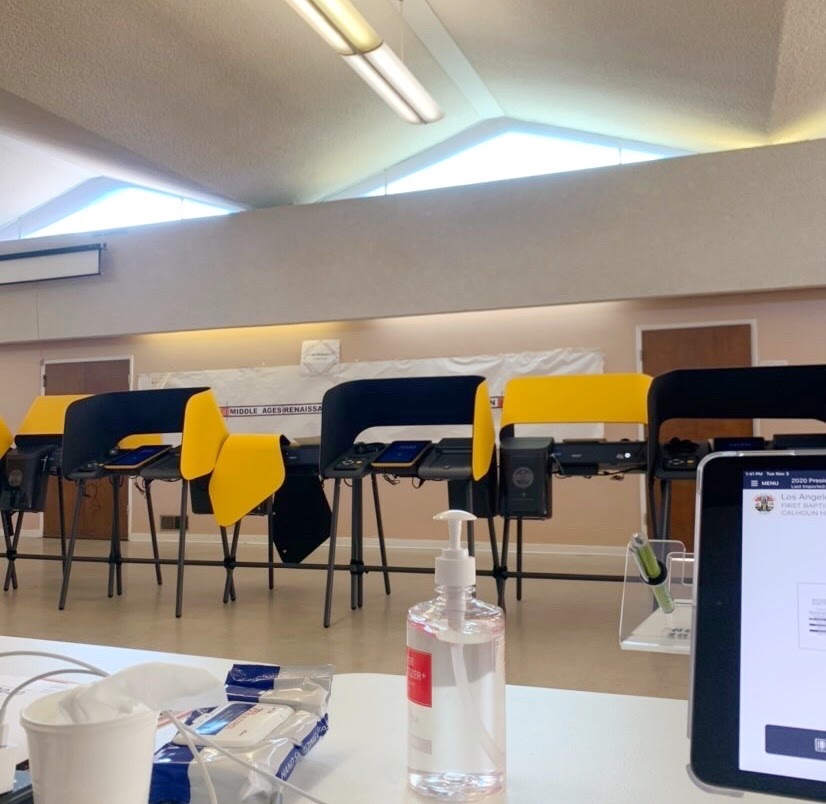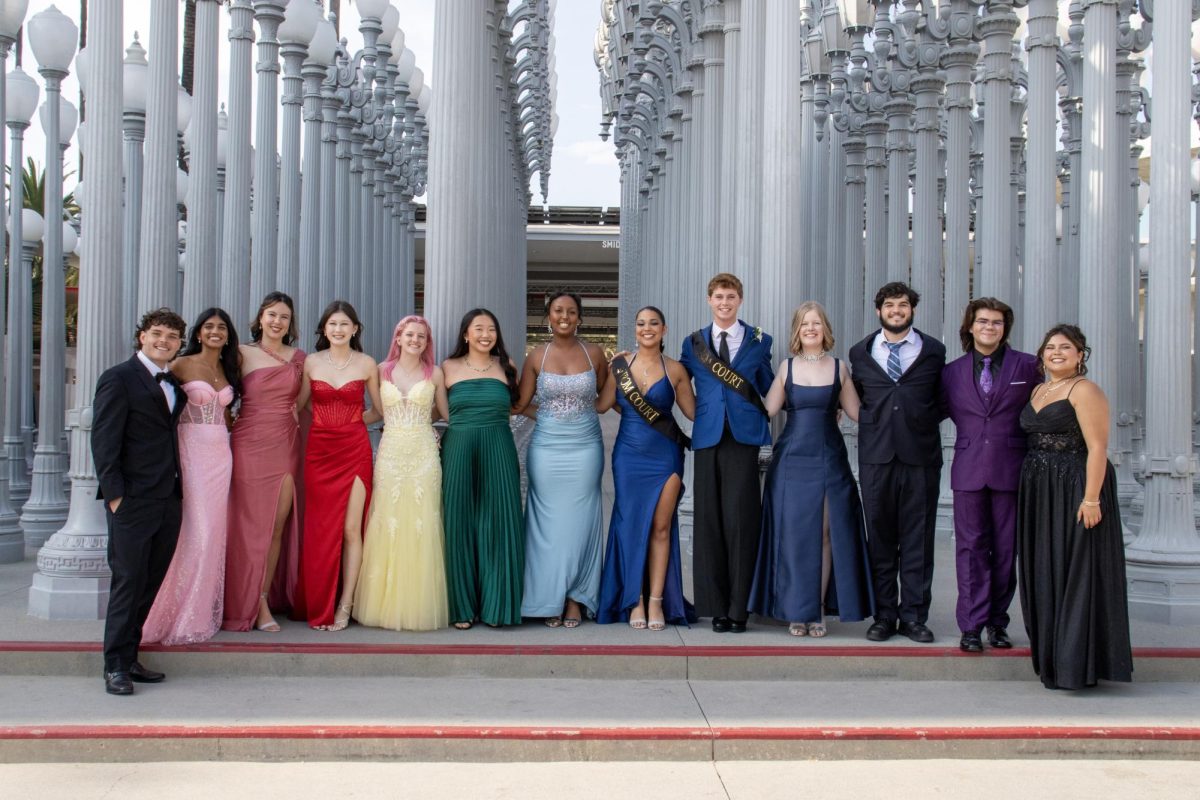What Happens on Election Day?
Drishti Tyagi (12) works a poll in Rolling Hills. She became a poll worker after a friend sent her an application and she received permission from a teacher. Tyagi said, “I chose to get involved because I’m not of voting age yet and I wanted to contribute however I could.” Photo courtesy of Drishti Tyagi (12).
November 3, 2020
The 2020 presidential election has been dramatic and high-stakes since the beginning of the year, but political tensions have only heightened. The election is now a conversation about COVID-19 vaccines, racial unrest, and partisanship. Before, the greatest unknown was whether Democrat Joe Biden or Republican Donald Trump would win the election and lead America for the next four years. Now, the nation is plagued with questions about the security of their votes, the legitimacy of the election, and the meaning of democracy.
This year, Election Day is November 3. Theoretically, Election Day is when the majority of people cast their ballots. In a typical election, states begin to count votes once polling stations close. Once they’re sure a candidate has an unbeatable lead, they call in the winner. News sites and networks keep a tally of the electoral votes as they’re won, and usually, a clear winner emerges by night on Election Day or early the next morning. To be an undisputed winner, one candidate has to secure a majority of 270 electoral votes.
However, this year is bound to look different. The first concern comes from the volume of mail-in ballots. While mail-in ballots have been used in many states for long before 2020, coronavirus restrictions have prompted an unprecedented amount of votes to be cast by mail ― roughly 100 million, more than double the amount in 2016. Postal services could be overwhelmed by the sheer number of ballots. Furthermore, President Trump cut back on funding the United States Postal Service in August, and it has yet to recover or be granted more funding. Coupled with the fact that mail-in ballots take longer to count, it appears that the nation will have to wait much longer for the winner.
Additionally, the race between Biden and Trump is likely to be close enough that it will be impossible to call a winner immediately. If the margin of votes between the two candidates is small, the winner may remain unclear for days or even weeks. It’s unlikely that Biden or Trump will emerge with a clear lead, so the time in between Election Day and an announcement of a winner is uncertain.
But even though it’s not typical, a delay in results isn’t unprecedented. Take the 2000 election between incumbent Republican George W. Bush and Democrat Al Gore, which came down to a few swing states. The most important state was Florida, in which Bush and Gore clashed in a legal battle over recounting votes. In the end, the Supreme Court ruled to stop recounts in Florida, which ultimately made Bush the winner of the 2000 election. But it took 36 days after Election Day for the Supreme Court to make their ruling.
In a similar way, the close race between Trump and Biden could mutate into a series of legal battles over battleground states. If that’s the case, there will likely not be any clear result on the night of Election Day or the morning after.
President Trump has also expressed concerns about fraudulent voting on numerous occasions. At the first presidential debate, he claimed that widespread use of mail-in ballots would lead to “fraud like you’ve never seen.” His doubts about mail-in voting have sparked uncertainty and alarm among voters. Can we even trust the legitimacy of the election?
However, according to election experts, the likelihood of the election being derailed by voter fraud due to mail-in ballots is very low. Election experts agree that the amount of fraudulent voting that occurs because of mail-in ballots is so miniscule that it’s highly unlikely to have any effect on the results of the election.
Michaela Dumlao (10), a member of West High’s Speech and Debate team, as well as an editor for a student-run political news site, added that “all methods of voting will contain the possibility of fraud. Voting by mail is just as safe and secure as in-person voting.”
Another concern of voters is whether the president will agree to a peaceful transition of power in the event that he loses. Peaceful transfer of power is a key part of democracy ― it signals that power belongs to the people, who elect the president, rather than the president, who may exercise power for a term but is ultimately beholden to the public. In September, President Trump was asked by a reporter if he would agree to a peaceful transfer of power. He replied by describing the ballots as a “disaster” and that “there won’t be a transfer, frankly, there’ll be a continuation.” Many have taken his lack of a clear affirmation as a refusal to commit to a peaceful transfer of power.
No president has ever refused a peaceful transfer of power. If President Trump loses the election and does not concede, the nation will be facing an unprecedented event.
The election has also evoked questions from newspapers and networks about the ethics of journalism. Some worry that a candidate will claim victory when the results are inconclusive. A premature claim to victory could send the nation into chaos or, at the very least, cause confusion.
Sarah Simmons (11) is a member of Model Legislature and Court, a student mock court program. She said that her “greatest fear for tonight is that people on both sides are going to declare a faulty election and cause riots and chaos everywhere.” Simmons and her family have stocked up on groceries, in case it’s too chaotic to go outside.
Television news networks have been wrestling with the possibility of candidates claiming victory in televised speeches. Is it better to televise speeches that could potentially enable confusion and chaos? Or is it better to censor a major address? Some networks have said that they will not censor any speeches, but they will attempt to distinguish between fact and speculation.
While analysts and journalists have been predicting possible outcomes ― especially concerning swing states, such as Pennsylvania, Florida, and Arizona ― the result of the election is far from obvious. The Los Angeles Times Editorial Board wrote that instead of indicating something is wrong, “not having a clear result by midnight would be a hopeful sign that even in the middle of a pandemic, democracy is working.”





